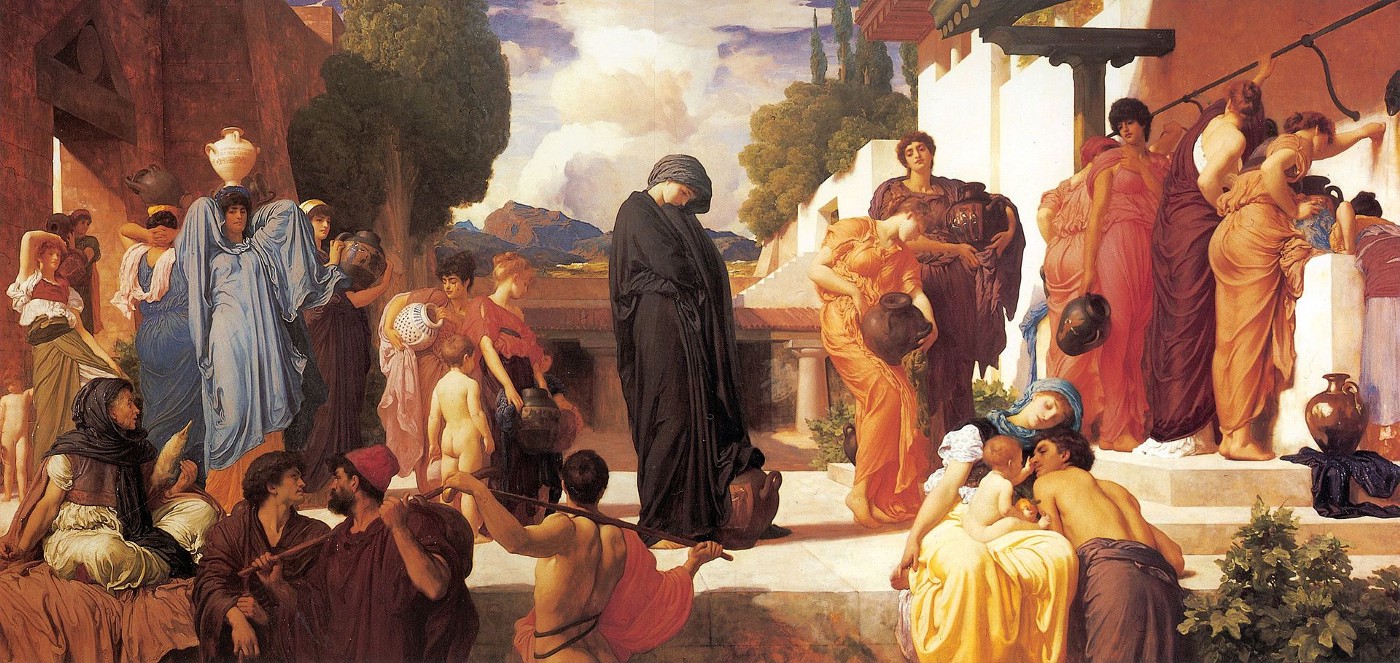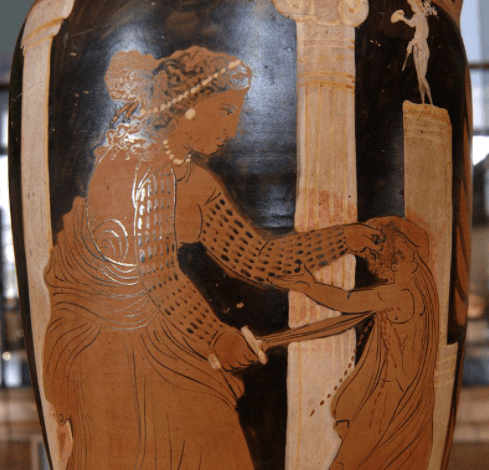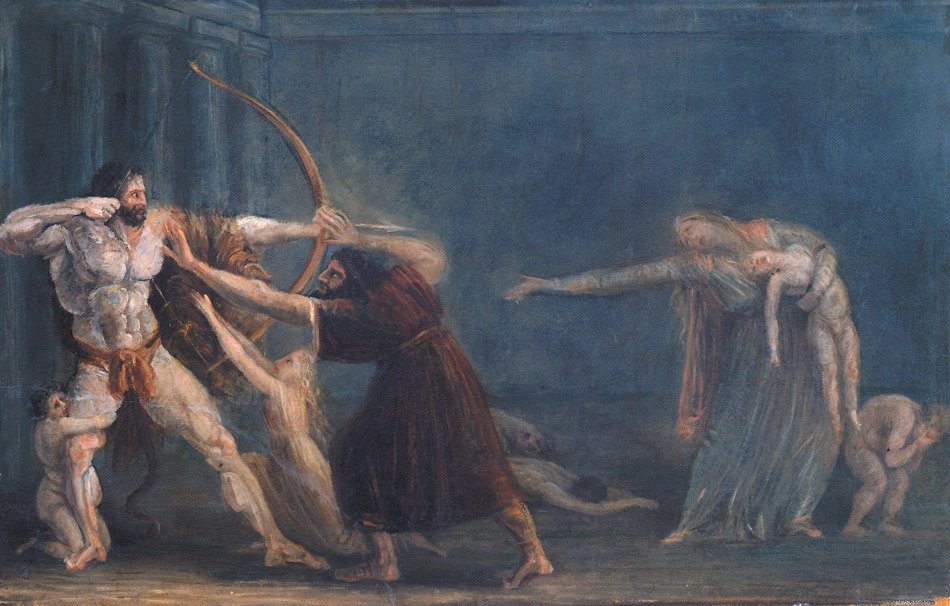by Andrew Aulner, Contributing Writer, Classical Wisdom
Euripides is unique among the three tragedians in that, unlike Aeschylus and Sophocles, there is no historical record that he ever served in the Greek military. Admittedly, Euripides was able to describe actual battle techniques in Phoenician Women and Children of Heracles, despite the lack of a record of him fighting in any battles. Hanson argues that it is probable that Euripides would have seen military service like his contemporary Sophocles; while there may be no hard evidence that Euripides ever served in combat, he did live through all but the final two years of the Peloponnesian War. In any case, this conflict led him to question his society’s martial values, while also showing him the toll of war upon civilians and returning soldiers.
Euripides lived under the dark specter of constant warfare, and his plays are correspondingly dark in their realism. Apart from being critical of established values, Euripides also subverts those values in reaction to contemporary events. Tritle writes that “…the outbreak of extreme violence [i.e. the Peloponnesian War] in 431 [BC] may have energized Euripides”, who is believed to have written the violent Medea in that same year. As city-states that had formerly been allies against mutual enemies like the Persians turned against each other, and Greek soldiers went off to war against those who had once been their countrymen—all of which suggests a confusing loss of values and morality—it seems fitting that Euripides would write a play in which a character feels justified in murdering her own beloved children in order to hurt her unfaithful husband. Each main party in the conflict, Athens and Sparta, could be viewed as harming their own blood relatives—their fellow Greeks—in order to inflict petty harm against the other. Euripides’ most popular play may never have come to be if not for the war that served as a historical backdrop to it.
This was not the only instance of military events influencing the playwright. The defeat of Athens at the Battle of Delium, as Hanson says, “helped shape Euripides’ developing disgust over the war—and his growing propensity to use his drama to critique contemporary culture even in Athens’s darkest hours”. By the time of the writing of Orestes, Euripides, who had witnessed over two decades of Greeks killing Greeks, goes so far as to condemn war as “‘a friend to lies’”. Even as he questioned Athenian values, Euripides used his stagecraft to declare his own firmly held anti-war beliefs while the world around him continued to crumble.
Another major theme of Euripides’ work is his sympathy for both the civilians who have no choice but to live during the ravages of war—particularly the wives of soldiers—as well as the fighters who must live with what they have done once they return home. In Heracles, a great warrior returns home and commits an act of violence upon his wife and children, shattering his own life even as he ends theirs in a fit of madness. This is a crystallization of the daily lives of the Greek women and children who bid their soldier husbands and fathers farewell, suffering their absence, and living in ignorance of how altered many of the men were upon their return.
For all of his anti-war sentiment and concern for civilians, Euripides is also painfully sympathetic toward the men who are called to fight in war. Euripides was even hired to write odes to the war hero Alcibiades after his successes at the Summer Olympics of 416 BC, during an “Olympic Truce” between the warring Greek city-states. For all of his anti-war sentiment, Euripides nevertheless showed an appreciation for valor both on and off the battlefield. Still, he feared the damage that unrestrained violence could do to men’s souls. There is even a suggestion of war-induced trauma—perhaps even a disturbance on par with Post-Traumatic Stress Disorder—within the psyche of Menelaus in Euripides’ Helen. Euripides uses his plays to honor those who fight in war, even as he confronts the long-lasting damage caused by war itself.
As different as the three tragedians were in style and in personal background, they all felt the impact of both the heroic and the horrific aspects of warfare. Whether through personal combat experience or life as a civilian bearing witness to warfare, each man came to an understanding of the immediate and ongoing dangers of armed conflict and subsequently grappled with those dangers through their art. The genre of tragedy was shaped by its writers, and its playwrights were shaped by the wars of their time. Aeschylus, who fought a victorious battle against the Persians at least once and perhaps even twice, sought to balance lofty idealism with gritty realism. Sophocles witnessed the suffering caused by ongoing conflict, as well as the relationship between society and its imperfect leaders, in both the Samoan revolt and the Peloponnesian War. Finally, Euripides was led to critique his world’s values as it became mired in the darkness of a seemingly endless struggle, while he also bore witness to the men, women, and children whose lives were irrevocably harrowed by that same conflict. War, a force that is harshly impersonal in abstraction yet deeply personal in actuality, shaped the elemental force that is classical Greek tragedy.
Works Cited
Hanson, Victor Davis. Ripples of Battle: How Wars of the Past Still Determine How We Fight, How We Live, and How We Think. Doubleday, 2003. Print.
Krentz, Peter. The Battle of Marathon. Yale University Press, 2010. Print.
Leahy, D. M. “The Representation of the Trojan War in Aeschylus’ Agamemnon.” The American Journal of Philology, vol. 95, no. 1, 1974, pp. 1-23, https://www.jstor.org/stable/293815. Accessed October 12, 2017.
Sommerstein, Alan H. Greek Drama and Dramatists. Routledge, 2002. Print.
Stoessl, Franz. “Aeschylus as a Political Thinker.” The American Journal of Philology, vol.73, no. 2, 1952, pp. 113-139, https://www.jstor.org/stable/291809. Accessed October 11, 2017.
Strauss, Barry. The Battle of Salamis: The Naval Encounter That Saved Greece—and Western Civilization. Simon & Schuster, 2004. Print.
Tritle, Lawrence A. A New History of the Peloponnesian War. Wiley-Blackwell, 2010. Print.
Woodbury, Leonard. “Sophocles Among the Generals.” Phoenix, vol. 24, no. 3, 1970, pp. 209- 224, https://www.jstor.org/stable/1087241. Accessed October 12, 2017.












One comment
the three tragedians were in style and in personal background, they all felt the impact of both the heroic and the horrific aspects of warfare. Whether through personal combat experience or life as a civilian bearing witness to warfare, each man came to an understanding of the immediate and ongoing dangers of armed conflict and subsequently grappled with those dangers through their art. The genre of tragedy was shaped by its writers, and its playwrights were shaped by the wars of their time. Aeschylus, who fought a victorious battle against the Persians at least once and perhaps even twice, sought to balance lofty idealism
https://www.clickercounter.org/
Our apologies, you must be logged in to post a comment.